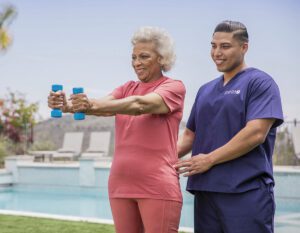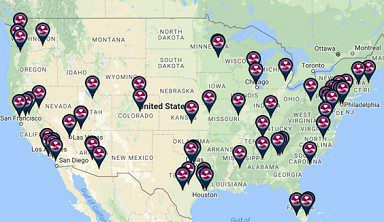February is American Heart Month, a time to raise awareness about heart disease and stroke—two of the leading causes of death among men and women. Heart disease is more common among older adults, with the risk increasing as people age. In the U.S., seniors aged 65 and older make up over half of all cardiovascular hospitalizations and procedures, and nearly 80% of deaths related to heart disease.
Moreover, cardiovascular disease doesn’t just impact longevity; it affects overall quality of life, independence, and well-being.
Why Heart Health Matters for Seniors
As we age, changes in the heart and blood vessels increase the risk of cardiovascular diseases. Factors like high blood pressure, high cholesterol, diabetes, and lifestyle habits contribute to heart disease and stroke risk.
The good news is that it’s never too early or too late to prioritize heart health. Simple steps like adopting a nutritious diet and staying active can help regulate blood pressure and cholesterol levels. More significant lifestyle changes, such as maintaining a healthy weight and quitting smoking, can lead to even greater long-term health benefits.
Action Steps for a Healthier Heart as Seniors Age
Here are key strategies seniors and their caregivers can adopt to promote heart health:
- Maintain a Heart-Healthy Diet
A diet rich in fruits, vegetables, whole grains, lean proteins, and healthy fats supports cardiovascular health. Seniors should aim to:
Reduce sodium intake to manage blood pressure.
Limit saturated and trans fats to lower cholesterol.
Stay hydrated and avoid excessive alcohol consumption.
- Stay Physically Active
Regular physical activity helps keep the heart strong. Seniors should engage in:
At least 150 minutes of moderate exercise per week (e.g., walking, swimming, chair exercises).
Strength training to maintain muscle mass and support circulation.
Balance exercises to reduce fall risk while staying active.
- Monitor Blood Pressure and Cholesterol Levels
High blood pressure (hypertension) and high cholesterol can lead to heart attacks and strokes. Regular health screenings help seniors and caregivers track and manage these risks.
- Manage Stress and Prioritize Mental Well-Being
Chronic stress and anxiety can take a toll on heart health. Relaxation techniques such as deep breathing, meditation, and engaging in hobbies can help reduce stress levels.
- Get Enough Sleep
Poor sleep is linked to high blood pressure and heart disease. Seniors should aim for 7-9 hours of quality sleep each night and address any sleep disorders like sleep apnea.
- Quit Smoking and Limit Alcohol
Smoking is a major risk factor for heart disease and stroke. Support is available for seniors looking to quit. Additionally, moderate alcohol consumption should be followed, as excessive drinking increases heart risks.
Heart Health Trends for Seniors
Staying on top of heart health isn’t just about traditional lifestyle changes. New trends are emerging that help seniors monitor and improve cardiovascular wellness:
Wearable Technology for Heart Monitoring – Smartwatches and fitness trackers with heart rate and ECG (electrocardiogram) monitoring, such as the Apple Watch, Fitbit, and KardiaMobile, help seniors track their heart rhythms and stay active.
Personalized Nutrition Plans – The Mediterranean and DASH diets continue to be top choices for heart health, but growing research is exploring how individualized nutrition based on genetics and lifestyle can optimize cardiovascular function.
Telehealth for Cardiovascular Care – Virtual doctor visits make it easier for seniors to consult with cardiologists and manage their medications without leaving home.
The Link Between Sleep and Heart Health – Studies show poor sleep can contribute to heart disease. Seniors are increasingly using sleep-tracking technology to monitor sleep quality and identify risks like sleep apnea.
Strength Training for Heart Health – While walking remains a staple, strength training is gaining traction as a key component of heart health, helping to improve circulation and reduce inflammation.
Caregivers: A Vital Role in Senior Heart Health
Family caregivers and senior care professionals play a crucial role in supporting older adults’ heart health. Encouraging healthy habits, assisting with medication management, and facilitating doctor visits can help seniors stay on track.
Family Caregiver Resources for Heart Health
For more information on heart health, visit:
American Heart Association (AHA): www.heart.org
National Institute on Aging (NIA): www.nia.nih.gov
Centers for Disease Control and Prevention (CDC): www.cdc.gov/heartdisease
Professional Help at Home for Managing Cardiovascular Heart Disease
At Amada Senior Care, we are dedicated to helping seniors maintain a heart-healthy lifestyle. A skilled and experienced Amada caregiver can assist senior clients in maintaining their overall health and managing symptoms of congestive heart failure (CHF) if needed. Their training enables them to distinguish between clear signs of CHF and anxiety, helping to prevent unnecessary hospital visits.
Amada Senior Care is here to support you with answers and personalized assistance. If you or a loved one need support with wellness, nutrition, or daily care, we’re here to help. Contact us today to learn more! CLICK HERE to find the Amada office nearest to you.















